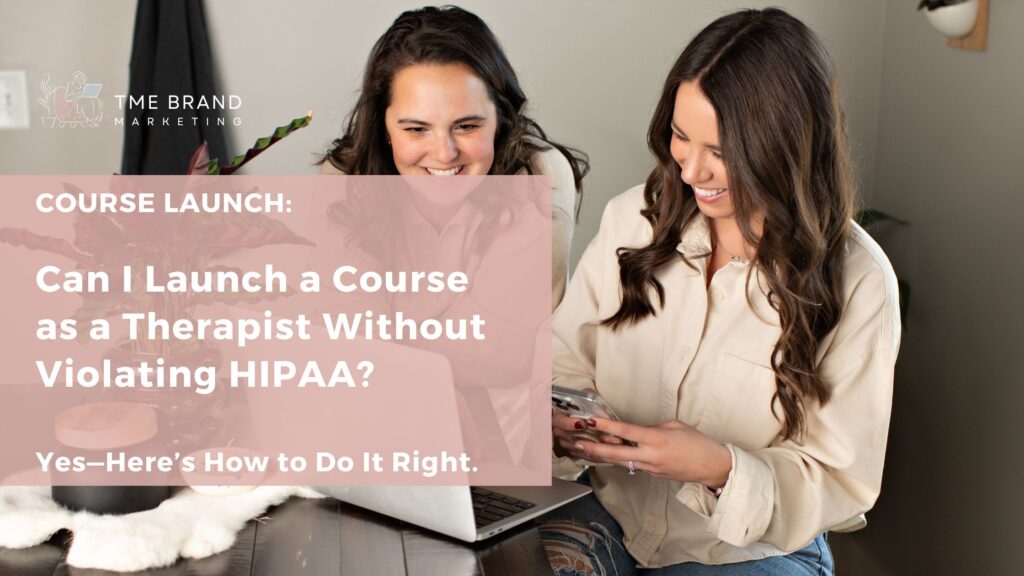
Can I Launch a Course as a Therapist Without Violating HIPAA? Yes—Here’s How to Do It Right.
If you’ve ever wondered, “Can I really create and sell a course as a therapist without running into HIPAA violations?”—you’re not alone. For therapists in the U.S., launching a course can feel like navigating a legal minefield: What if someone thinks I’m offering therapy? What if my email list includes past or current clients? What if I accidentally disclose something I shouldn’t?
Here’s the good news: You absolutely can create and sell a course. But to do it ethically and legally, you need a plan that prioritizes privacy, sets clear boundaries, and markets smart.
Let’s break it down.
First, What Isn’t HIPAA-Compliant?
HIPAA (Health Insurance Portability and Accountability Act) protects identifiable health information. That means anything that could connect a person’s health status or care to their identity. The moment you’re handling protected health information (PHI) in a way that could be linked to an individual, you’re in HIPAA territory.
So, here’s what not to do when marketing your course:
🚫 Email your therapy clients about your course through your EHR
🚫 Reference past or current clients in testimonials without written, HIPAA-compliant consent
🚫 Blur the line between “course” and “therapy” in your language
What Is Okay (and Smart)?
Consider creating your course under a separate business entity.
Set up a distinct LLC, sole proprietorship, or DBA for your course brand. This keeps your clinical services separate from your educational content. It also allows you to use non-HIPAA platforms like Mailchimp or Kajabi for email and course delivery.
Write disclaimers everywhere.
Clearly state: This course is for educational purposes only and is not a substitute for therapy, diagnosis, or medical treatment. Add this to your website footer, your course platform, and your welcome email.
Don’t target your therapy clients.
Your clients are under your care—not your marketing strategy. Market your course to a general audience, not your caseload.
Use marketing tools that aren’t tied to PHI.
Platforms like ConvertKit, Kajabi, Thinkific, and Podia are NOT HIPAA-compliant—and they don’t need to be if you’re not collecting PHI. Just make sure you’re not uploading client info.
Join us for our upcoming webinar - The StandOut Course Creator - A Webinar For Therapists Looking to Build a Course
StandOut Course Creator is a 50-minute on-demand webinar designed to help therapists take the first confident step toward building a digital course. If you’ve been thinking about expanding beyond 1:1 sessions and creating an online offer—but aren’t sure where to begin—this webinar is your starting point.
You’ll learn:
The 4 key stages of course creation—from idea to launch
What kind of course is right for you (and your audience)
How to structure your offer without overwhelm
Simple strategies to grow interest before you build
Common mistakes therapists make when launching—and how to avoid them
Whether your goal is to scale your impact, increase your income, or simply explore new ways to share what you know, this training will give you the clarity and direction to move forward.
Who Should You Market To?
Here’s where a lot of therapists miss a golden opportunity: Your course doesn’t have to be for therapy clients at all. In fact, it’s often more aligned (and easier) to sell to:
1. Other Therapists or Coaches
You already have professional insight and frameworks that others in your field want to learn.
Examples:
A course for new grads on setting up a private practice
A workshop on Emotionally Focused Therapy interventions
A self-paced CEU course on trauma-informed care
This niche is especially valuable because:
You can charge more
There are no HIPAA worries
You’re contributing to the profession
Referrals and collaborations can follow
2. The General Public Seeking Education (Not Therapy)
Your course might teach coping tools, emotional regulation, parenting strategies, or stress relief techniques—but without offering therapy or promising individual transformation.
Examples:
“Raising Emotionally Healthy Teens: A Parent’s Guide to Boundaries & Validation”
“Self-Regulation 101: Tools to Manage Anxiety Before It Manages You”
Focus on skills and psychoeducation, not support or diagnosis.
Building Your Audience (Without Breaking HIPAA)
This is the part where therapists usually say: “Okay, but how do I actually get people to buy this thing?”
Here’s your roadmap—ethically and effectively:
1. Create a New Email List—From Scratch
You cannot use emails from your therapy intake forms. Start fresh.
Offer a freebie (e.g. checklist, worksheet, webinar) related to your course topic.
Use platforms like ConvertKit, Mailerlite, or Flodesk (no PHI = no HIPAA).
Drive signups via your website, social media, or podcast interviews.
2. Grow an Audience Around Your Niche
Choose 1–2 platforms where you’ll consistently show up. Instagram? YouTube? LinkedIn? A weekly newsletter?
Start by:
Posting psychoeducational content
Sharing bite-sized tips or infographics
Hosting free events or webinars
Collaborating with others in adjacent niches
Example:
If your course is on parenting teens with anxiety, share Instagram reels about what not to say to anxious teens, tips on building trust, or scripts for emotionally charged conversations.
3. Make Your Course Part of a Value Ladder
You don’t have to start with a $500 course. You can warm people up with free content, a $27 mini-course, or a $47 workbook.
Let your audience grow with you:
Freebie →
Newsletter →
Webinar or Workshop →
Full course →
Group or mastermind (if appropriate)
This keeps your marketing clear and your boundaries solid.
4. Use Disclaimers in Your Bio and Course Pages
Just to hammer this home: Disclaimers are your friend.
Anywhere you mention your course, say something like:
“This content is for educational purposes only and does not establish a therapist-client relationship.”
This keeps expectations clear, and it keeps you protected.
Final Thoughts: Stay in Your Lane (and You’ll Be Fine)
Selling a course isn’t unethical. It’s not even legally complicated—as long as you respect the line between therapy and education. Avoid marketing to clients. Avoid using PHI. Set up a separate brand, deliver real value, and clearly define what your course is (and isn’t).
You can build something impactful, sustainable, and aligned with your clinical values—without compromising your license or your clients’ trust.
The Bottom Line: You Don’t Have to DIY This
You’re a therapist, not a tech wizard with 14 arms and a full-time marketing degree. But we are.
If you’re ready to turn your expertise into a course that makes money while you’re in session—or gasp on vacation—we’re here to help.
We’ll handle the tech, the strategy, the design, the emails, and even the webinar setup (yes, all of it).
👉 Ready to launch your course with confidence and keep your cool? Book a free consult below or click here to download our free mini guide.
SCHEDULE A CALL
Free Discovery Call
This call is an opportunity to understand where you are right now and explore how the TME Brand Marketing Team can help you reach your goals. Find a time on our calendar to schedule your call today—we’re excited to connect with you soon!




